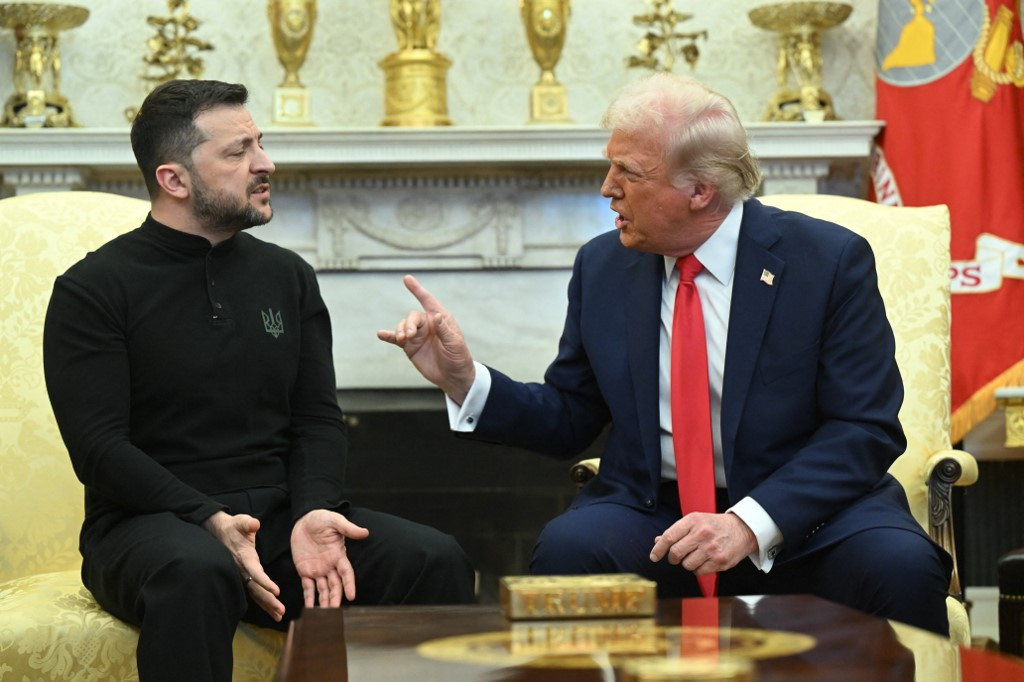Popular Reads
Top Results
Can't find what you're looking for?
View all search resultsPopular Reads
Top Results
Can't find what you're looking for?
View all search resultsTrump’s big deal or small deal? Buying time to compete
2025 is Trump 2.0’s wakeup call that Europe cannot take the United States' defense umbrella for granted.
Change text size
Gift Premium Articles
to Anyone
N
o historian could have watched the Feb. 28 Donald Trump-JD Vance-Volodymyr Zelensky press briefing without recognizing that it was a 21st century ritual execution of another Roman gladiator in front of a worldwide audience.
United States President Trump gave a lesson in brutal realpolitik to the world when he told Ukrainian President Zelensky that “you don’t have the cards right now. With us, you start having cards […] You’re gambling with World War III.”
Two weeks earlier, Vice President JD Vance shocked Europe during the Munich Security Conference saying that the greatest enemy was Brussels (and not Moscow) that was stifling innovation, under-spending on defense and not pulling its fair share of weight on Ukraine.
At that conference, Singapore Defense Minister Ng Eng Hen quipped that the US had shifted from a country once perceived as a force of “moral legitimacy” to something akin to “a landlord seeking rent”. Sorry, it’s more like a capo dei capi (boss of the bosses) telling his underlings that they need to pay more for his protection.
If Trump1.0 was China’s wakeup call in 2018 when he launched the first round of tariffs and sanctions, 2025 is Trump 2.0’s wakeup call that Europe cannot take the US’ defense umbrella for granted.
While Trump detractors dismiss his actions and pronouncements as chaotic and destructive, his ongoing campaign to “Make America Great Again” carries two clear goals: One is to restore US manufacturing prowess under the tariff wall and the second is to restore the US’ unipolar position.
Three years of carnage and destruction from the Ukraine war drew four crucial lessons for Trump and his right-wing tech oligarchs.
First, forever wars have been bleeding the US fiscally and industrially, delaying the US’ ability to focus on its peer rival, China.
Second, both Zelensky and Netanyahu are leaders of small states that act as “tails wagging the dog”, because they could commit the US to nuclear war with no upsides. For the US to regain policy sovereignty, both leaders must be brought under control.
Third, tariffs and deals like claiming rare mineral rights from Ukraine are essential for reducing the unsustainable American fiscal deficit. Since Trump cannot increase income taxes to antagonize his rich supporters and the Federal Government cannot impose sales tax, increasing tariffs reduces the fiscal deficit and rising debt, which also buys time for the US to onshore its manufacturing prowess.
Fourth, the Ukraine and Gaza wars demonstrate that the nature of 21st century warfare depends critically on low-cost drones and mass production capacity in conventional ammunition, unmanned armed robots and smart hardware.
Hence, ceasefires in Ukraine and Gaza will buy time to rebuild the US’ capacity to fight World War III and focus attention on its peer competitors, China and Russia, both of which have the manufacturing capacity and logistics to produce armaments at scale and also at lower cost than the US.
Trump’s art of the deal often throws his protagonists under the bus: "Sometimes, part of making a deal is denigrating your competition."
The fatal mistake of the Biden administration and Europe was to eschew diplomacy in negotiating with Russia over how to settle the Ukraine war. Their blind spot was to assume that you cannot negotiate with the devil, forgetting European history that almost all wars are eventually settled through negotiation or full surrender after brutal wars.
Europe’s other amnesia was an overblown view of its own status, because Russia knew that a new European security strategic order could only be given by the US as head of NATO and over 100,000 troops deployed in Europe.
NATO is fighting a proxy war, asking Ukraine to fight against an enemy four times larger in population and eight times larger in gross domestic product (GDP). With declining armaments supplies and resources from Europe and the US, it is a matter of time before Ukraine would lose on the battlefield.
Trump cannot afford to inherit another loser or forever war from Biden. Thus, from a cost-benefit point of view, the off-ramp strategy is to negotiate with Russia and leave the costs of shoring up Ukraine and defending Europe to Europe itself.
The rare minerals deal simply tells Ukraine that the cost of continued support is America’s skin in the game, meaning a profitable stake in Ukraine’s resources. Zelensky’s fatal error was to assume that his high moral standing as the Churchillian savior of his people was enough to secure continued US support.
Trump was never going to allow someone without any cards to declare World War III on his behalf. As long as the region has outsourced its security and trade to the US (the largest European trading partner), Europe has no genuine sovereignty.
Europe also has few cards to play. After three years of brutal fighting, the Russian army has regained confidence that it can take on Europe in conventional arms, but not against the combined resources of Europe plus the US.
Putin knows that his real negotiating party is the US as de facto head of NATO. A deal is possible because no party wants a prolonged war of attrition, not even China.
After the ritual putdown of Zelensky, the Europeans have woken up to the merciless reality that they either remain as subservient vassals or somehow unite together to regain their collective pride and sovereignty.
No European leader has emerged to lead the way, because Europe is not just a collection of squabbling members, but also totally divided within each nation.
If Trump is able to pull off ceasefires in Ukraine and lasting peace in Gaza, he would go down in history as a Big Deal President. He has boldly swept aside all the niceness and high moral pretense of the post-war neoliberal order.
The harsh reality is no-holds barred negotiations to buy time to square off for the next Great Power Art of the Deal. Let the show begin.
---
The writer is a distinguished fellow at the Asia Global Institute and chief adviser to the China Banking Regulatory Commission. The views expressed are personal.











